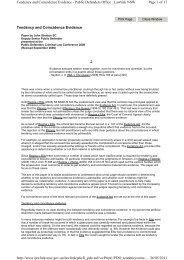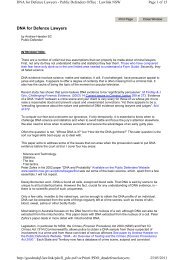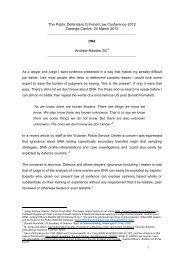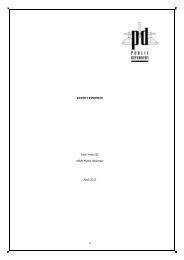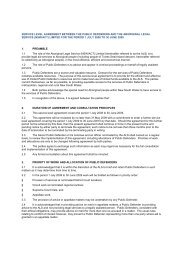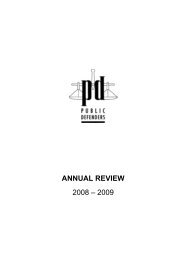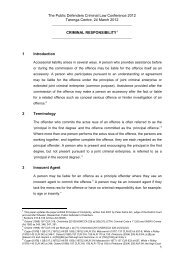Right to Silence: inferences from silence - The Public Defenders
Right to Silence: inferences from silence - The Public Defenders
Right to Silence: inferences from silence - The Public Defenders
Create successful ePaper yourself
Turn your PDF publications into a flip-book with our unique Google optimized e-Paper software.
(i)<br />
section 6 of the Criminal Justice Act 1987 (application for dismissal of<br />
charge of serious fraud in respect of which notice of transfer has been<br />
given under section 4 of that Act); or<br />
(ii) paragraph 5 of Schedule 6 <strong>to</strong> the Criminal Justice Act 1991<br />
(application for dismissal of charge of violent or sexual offence<br />
involving child in respect of which notice of transfer has been given<br />
under section 53 of that Act);<br />
(c)<br />
(d)<br />
the court, in determining whether there is a case <strong>to</strong> answer; and<br />
the court or jury, in determining whether the accused is guilty of the offence<br />
charged, may draw such <strong>inferences</strong> <strong>from</strong> the failure as appear proper.<br />
(2A)<br />
Where the accused was at an authorised place of detention at the time of the failure,<br />
subsections (1) and (2) above do not apply if he had not been allowed an opportunity<br />
<strong>to</strong> consult a solici<strong>to</strong>r prior <strong>to</strong> being questioned, charged or informed as mentioned in<br />
subsection (1) above.<br />
(3) Subject <strong>to</strong> any directions by the court, evidence tending <strong>to</strong> establish the failure may<br />
be given before or after evidence tending <strong>to</strong> establish the fact which the accused is<br />
alleged <strong>to</strong> have failed <strong>to</strong> mention.<br />
(4) This section applies in relation <strong>to</strong> questioning by persons (other than constables)<br />
charged with the duty of investigating offences or charging offenders as it applies in<br />
relation <strong>to</strong> questioning by constables; and in subsection (1) above ‘officially informed’<br />
means informed by a constable or any such person.<br />
(5) This section does not—<br />
(a)<br />
(b)<br />
prejudice the admissibility in evidence of the <strong>silence</strong> or other reaction of the<br />
accused in the face of anything said in his presence relating <strong>to</strong> the conduct in<br />
respect of which he is charged, in so far as evidence thereof would be<br />
admissible apart <strong>from</strong> this section; or<br />
preclude the drawing of any inference <strong>from</strong> any such <strong>silence</strong> or other reaction<br />
of the accused which could properly be drawn apart <strong>from</strong> this section.<br />
(6) This section does not apply in relation <strong>to</strong> a failure <strong>to</strong> mention a fact if the failure<br />
occurred before the commencement of this section.<br />
<strong>The</strong> function of s. 34 is <strong>to</strong> permit the tribunal of fact (magistrates or jury) <strong>to</strong> draw<br />
‘such <strong>inferences</strong> as appear proper’ (s. 34(2)) <strong>from</strong> the accused’s <strong>silence</strong>, provided that<br />
the various conditions in s. 34(1) are made out and any questions of fact arising there<br />
under are resolved against the accused (Argent [1997] 2 Cr App R 27).<br />
Argent sets out six formal conditions that have <strong>to</strong> be met:<br />
(1) <strong>The</strong>re had <strong>to</strong> be proceedings against a person for an offence;<br />
(2) <strong>The</strong> failure <strong>to</strong> answer had <strong>to</strong> occur before a defendant was charged (subject <strong>to</strong><br />
s.34(1)(b));<br />
(3) <strong>The</strong> failure had <strong>to</strong> occur during questioning under caution by a constable or other<br />
person within section 34(4);<br />
Colin Wells July 2013 Page 4



